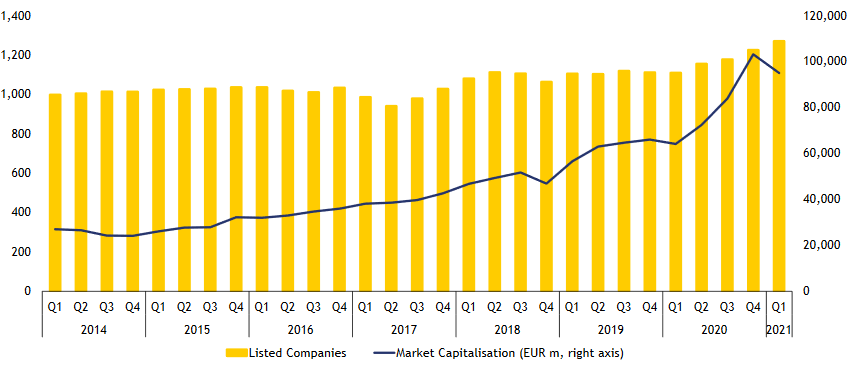European small businesses

Related topics
Access to finance for SMEsdate: 29/06/2021
In October 2020, the Commission set up a Technical Expert Stakeholder Group on SMEs (TESG). The group was tasked with putting forward concrete recommendations on how to further promote access to public markets for small and medium-sized enterprises (SMEs). On 25 May, the TESG published its final report.
Access to finance
SMEs are the key drivers of economic growth, employment and innovation in the EU and beyond. However, despite their strategic importance as a cornerstone of economic development, public listings of SMEs remain low in Europe. As shown by the chart below, the total number of listed companies on European markets targeted to listing SMEs has barely increased since 2014, despite the fact that those listed enjoyed clear benefits (as evidenced by the increase in their market capitalisation).
Number of listed companies on markets targeted to listing SMEs in Europe remains flat

Source: FESE Capital Markets Fact Sheet 2021
The administrative burden, as well as the high costs of listing and of compliance with listing rules dissuade many SMEs from accessing public markets. This limits the range of available funding options for companies hoping to scale up and grow. This is all the more relevant in a post-crisis context, where smaller companies in particular need to have easy access to equity funding.
Broadening access to market-based sources of financing for European companies, at each stage of their development, is at the heart of the EU’s capital markets union (CMU) project. To achieve this, the CMU initiative is trying to create a regulatory environment that supports access to public markets for SMEs. In January 2018, a new category of multilateral trading facilities was introduced under the markets in financial instruments directive (MiFID II) to facilitate high-growth SMEs’ access to public markets and increase their funding opportunities (SME growth markets). The goal of SME growth markets is to make it easier for SMEs to list and remain public, by tearing down the regulatory and market barriers standing in the way. The European Parliament and Council subsequently asked the Commission to set up a technical expert stakeholder group to “monitor the functioning and success of SME growth markets”. The TESG brought together stakeholders with relevant technical expertise on SMEs’ access to finance. The group looked at current legislation and assessed whether it is enough for SMEs hoping to access public markets. It also identified further ways to improve the rules and encourage SME listings. The TESG report, called “Empowering EU Capital Markets for SMEs - Making listing cool again”, was published on 25 May.
Final report
The TESG stresses the need to reform capital markets’ rules in order to ensure that EU capital markets can help fast-growing companies to access funds by listing on public markets. The TESG pointed to a market failure in EU public capital markets, which limits considerably the ability of SMEs to use them as a robust source of funding. This has ramifications for the ability of European companies to compete in global markets and survive financial crises or other shocks.
Building on this premise, the TESG report put forward concrete ideas for:
- simplifying regulatory requirements imposed on SMEs
- creating a more dynamic SME ecosystem
- increasing the visibility of SMEs
- encouraging a higher participation/investment by both retail and professional investors in SMEs
The TESG tabled 12 recommendations, which will be examined and assessed by the Commission. The recommendations focus on a number of issues, including simplifying prospectus and market abuse regulations, making it possible to use multiple voting right shares across the EU, using pre-listing sandboxes and transitional periods, providing additional research coverage, developing and simplifying environmental, social, and governance (ESG) disclosure by SMEs, as well as empowering retail investors. The overall aim of the TESG proposals is to deliver proportionate listing requirements for SMEs, encourage Member States to introduce accommodative tax policies, increase investor access, and improve the visibility of SMEs.
The way forward
The report will feed into the Commission’s work to promote and diversify small and innovative companies’ access to funding by considering simplifications to listing rules, which is one of the aims set down in the capital markets union new action plan.
